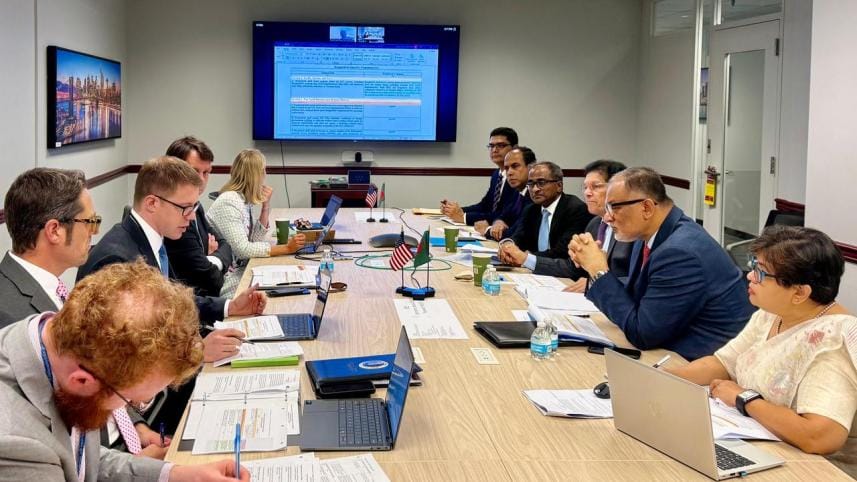Final push to beat US tariff deadline

As US President Donald Trump prepares to roll out sweeping new tariffs on countries without bilateral trade deals, Bangladesh has entered final negotiations in Washington, DC, scrambling to shield its economy from the threat of a 35 percent duty on its exports.
Speaking from his luxury golf resort in Scotland on July 28, Trump told reporters that countries failing to secure tailored trade agreements with the United States would soon face tariffs of 15-20 percent on their exports. "Probably one of those two numbers," he said, sitting alongside British Prime Minister Keir Starmer. "We can't sit down and make 200 deals," Trump added, signalling a sharp departure from multilateral trade norms.
We are confident our position is being seriously considered. We've made major offers to help balance trade, and the tone of the meetings has been constructive.
The announcement, which follows an earlier 10 percent baseline tariff imposed in April, has ignited a frenzy of negotiations around the world. Countries including Pakistan, Thailand, and Canada are all in last-ditch talks to reduce the blow. Yesterday, Trump said he would impose a 25 percent tariff on India's exports.
Bangladesh, which had already been in bilateral discussions with the United States Trade Representative (USTR), is now racing to finalise a deal before the window closes on August 1.
On Wednesday, it was expected to join the second day of the final negotiations in Washington, DC, led by Commerce Adviser Sk Bashir Uddin. He was accompanied by National Security Adviser Khalilur Rahman, Commerce Secretary Mahbubur Rahman and Additional Commerce Secretary Nazneen Kawsar Chowdhury.
On the US side, Assistant Trade Representative Brendan Lynch is leading the delegation, accompanied by officials handling trade and tariff matters.
Bangladesh's economy is heavily reliant on exports to the United States, particularly garments, which made up the majority of the $8.2 billion in goods shipped to the American market in 2024. Bangladeshi officials fear that any tariff above the current levels would severely damage competitiveness and disrupt employment in an already pressured global market.
Speaking from Washington, Commerce Secretary Rahman expressed cautious optimism. "We are confident our position is being seriously considered. We've made major offers to help balance trade, and the tone of the meetings has been constructive."
In recent weeks, Bangladesh has revised its negotiating strategy, presenting a package of concessions and market access promises that directly address US concerns over its $6 billion trade surplus with Dhaka.
The government plans to import 3.5 million tonnes of American wheat over the next five years and purchase 25 Boeing aircraft under a multibillion-dollar deal. Additional plans have been offered to expand the import of US liquefied natural gas, cotton, soybeans, and other agricultural products.
These proposals, Bangladeshi officials say, are aimed at demonstrating reciprocal trade goodwill and positioning the country as a cooperative economic partner in Washington's new trade architecture.
Privately, some Bangladeshi delegates suggest the country could increase US imports by as much as $2 billion annually if policy support on port infrastructure and shipping logistics were improved at home. One major importer of US commodities, who requested anonymity, said this week from Washington that a favourable tariff outcome would unlock significant trade potential. "If the government provides proper port facilities, we could easily scale up imports of soy and LPG," he said.
The final outcome of the talks will be revealed soon. But there is no question that Bangladesh is now in a race against the clock.
US-INDIA TALKS BREAK DOWN
Elsewhere, some countries are experiencing far rougher treatment. India, the world's fifth-largest economy, has already been hit with a 25 percent tariff by the Trump administration, along with a warning of additional penalties over the country's military and energy purchases from Russia.
Talks between Indian and US negotiators, which had stretched over months, broke down over New Delhi's refusal to open its domestic market to US agricultural products. Washington had pushed for access to sensitive sectors including wheat, rice, corn, and genetically modified soybeans -- demands India resisted, citing the need to protect smallholder farmers.
The Indian tariff decision has alarmed exporters in Delhi, particularly those in labour-intensive industries such as garments, pharmaceuticals, jewellery, and chemicals. With India's exports to the US valued at $87 billion in 2024, the economic fallout could be significant.
For Bangladesh, the difference between being in and out of a deal could define the trajectory of its economy over the coming years. The country's ready-made garments sector, which employs more than four million workers, is already operating on razor-thin margins. Any added tariff, even in the 15 percent range, would squeeze exporters and make it harder to compete with rivals like Vietnam and China, both of which have made strategic inroads in the US market.
As the deadline nears, the mood in Dhaka's export hubs is tense. "We are holding our breath," said a senior executive at a leading apparel group. "The US is our largest market. A tariff of 35 percent would destroy that. Even 15 percent is not easy. We need this deal."
For now, Bangladesh is still at the negotiating table, its economic future hanging in the balance. Whether it secures relief or joins the growing list of countries facing Trump's new tariff wall will be decided in a matter of hours, and could shape the nation's trade landscape for years to come.




 For all latest news, follow The Daily Star's Google News channel.
For all latest news, follow The Daily Star's Google News channel.
Comments